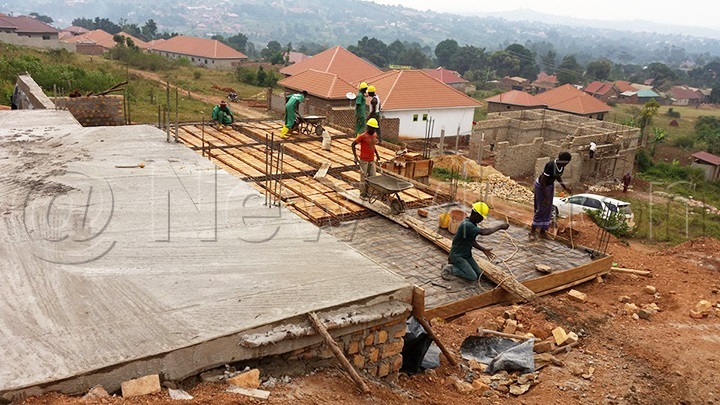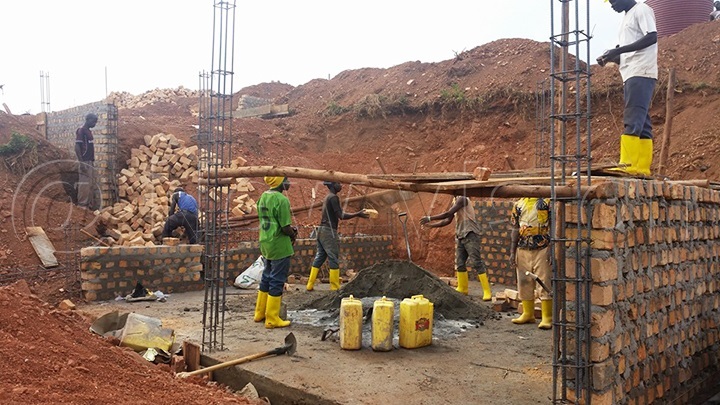Illegal construction thrives during the lock down
Many people in different suburbs have taken advantage of the lock down period when authorities are ‘sleeping’ to complete their buildings, some doing it illegally.
HOMES & CONSTRUCTION
Three years ago, Moses Bakunda bought a 150X50ft piece of land in Kira municipality, Wakiso district. He asymmetrically split it to accommodate his three-bedroom house.
On the remaining part, he planned for a block of three in one rentals. However, after saving enough money, he changed his mind.
He embarked on a storeyed apartment block with four units. This was in breach of the original plan.
Last year, the law enforcement officers barred him from adding a floor. The project stalled.
When the lockdown due to the COVID-19 pandemic happened, he saw it as an opportunity to complete his property, a goal he achieved.
Bakunda is not alone. Many people in different suburbs have taken advantage of the lock down period when authorities are ‘sleeping' to complete their buildings, some doing it illegally.
Structures have sprouted and some owners seem to be in a rush to complete them.
The law will catch up with you
Geoffrey Kato, a senior physical planner at Kira Municipal council notes that lock down or no lock down, some people have always adamantly built ilegally.

This also includes building without an approved plan. But there are also many who are building legally.
They had prepared and saved to build around this time, so nothing can stop them.
"It doesn't mean that whoever is constructing a building in these times is doing it illegally. Despite the hard times, some people saved money and have the time to supervise their projects," he says.
However, Kato clarifies that the enforcement officers were not ‘locked down' as some people presume.
"We have been working normally and enforcing the law. Many wrong doers continue to pay the price," he says.
Kato adds that during the lock down many whistleblowers reported neighbours who block roads, drainages and others who have been building in road reserves.
"We advise people to have approved plans before building and also encourage whistleblowers to report those building illegally for better planned neighbourhoods," he says.
He refers to an amendment in the physical planning act that empowers residents to sue those breaking the building and sanitation rules. For example, one can sue another for littering the streets.
The amendment also empowers local leaders like sub-county chiefs to be responsible in ensuring safe and well planned neighbourhoods.
On the other hand, Kato advises that before developing any land, one should consult with the authorities especially the Physical Planning Committee to ascertain whether their individual plan fits within the broader plan.
He adds that there are different land uses and all have different impacts depending on what one intends to use the land for.
So, before you even buy a piece of land, seek guidance from the relevant authorities. For example, some land can be for residential purposes and other places for industries and recreation centres.

Elsewhere, Andrew Twesigye an enforcement in the Mukono municipal council says that while many buildings have mushroomed during the lock down, many owners have approved plans.
"There are a few big-headed ones whom we have been hunting down. People should know that we are not asleep. Our surveillance teams continue to be active," he says.
Mind the strength of your building
James Joloba, an engineer, warns those in a rush to complete stalled buildings in this season, mostly flats, without taking into consideration the condition of the structure.
"If say the iron bars were not protected well, they attract corrosion, hence rusting. It's very dangerous to just add new ones to the rusted bars," he explains.
Joloba adds that this challenge comes with long term adverse effects. The building will automatically give way in future.
However, he notes that if the bars were protected, one can go ahead and complete their building but only if they have an approved plan.
The same applies to bungalows. Do not just rush to complete them. Before resuming construction, one should consult with an experienced construction expert to assess the state of the structure; looking at the walls, beam and foundation.
Avoid middlemen
Joloba says that municipal councils have a shortage of manpower to enforce laws. And as such, some people take advantage of this to build illegally.
It is not wise to trust middlemen with a construction project because many of them are not professionals.
"Middlemen are a very big challenge. They convince people to pay them for supposed services, only for the middlemen to fleece them. After losing millions, many people give up and decide to build illegally," he says.
"Our enforcement team is overwhelmed but we endeavor to be on ground, working tirelessly to achieve planned neighbourhoods," he says.
Kato advises people to consult with the relevant offices to be helped.
"We handle everyone as they come. Don't fear offices because they can all handle issues, depending on the complaints," he says. Adding that: "Avoid short cuts because they cost too much through middlemen," he cautions.
Why plans delay
Joloba says a plan shouldn't take more than three weeks to be approved or rejected.
This is because the physical planning committees usually sits after two weeks to ensure that there are a number of plans to be worked on.
According to Joloba, even if one builds illegally, they will still have to consult with the authorities. For example, when it comes to occupying the building, one will need to consult with the authorities.
For instance, they may need an occupancy permit especially for commercial properties like apartments.
Tenants usually ask for the permits from the landlords. Similarly, Jolaba cautions against the builders' people contract.
He says a qualified construction expert cannot work on an illegal site because it puts them at risk. The quark ones usually disappear when things turn out badly.
"Clients should know that one is totally liable when their structure gives way. So, pay attention to the engineer you entrust," he says.